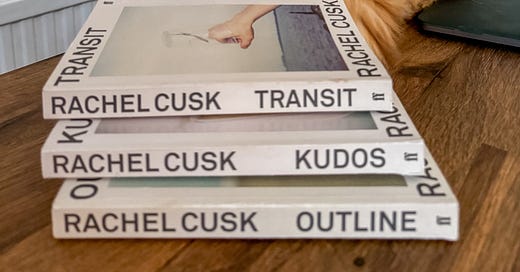How it felt to leave, to go away from what you knew and put yourself somewhere else.
Rachel Cusk’s Outline Trilogy is one of the most quietly radical works of contemporary literature—a masterclass in voice, restraint, and the art of listening. Comprising “Outline” (2014), “Transit” (2016), and “Kudos” (2018), the trilogy is a deep, deliberate observation of people’s lives and existential questions.
At the centre—though rarely at the forefront—is Faye, a writer and mother who, after her divorce, moves through a series of conversations, encounters, and reflections. But Cusk isn’t interested in telling us what happens to Faye in the traditional sense. These novels are less about her personal story and more about the people she meets and the stories they choose to share with her.
In each book, Faye is named just once. In “Outline”, it’s in passing, by a mortgage adviser—a moment of quiet, crushing loneliness. In “Transit”, it’s piercing, spoken by her lover. In “Kudos”, it’s by her son during a phone call.
Cusk’s ability to include so many voices in a single book never feels overwhelming. You don’t get lost, and no story feels like it’s been compromised to make space for another. Faye, as the quiet narrator, draws out what feels like the core story of each person—as though everyone has one defining narrative that shapes the rest of their life. Her voice is mesmerising. She mostly listens, but when she speaks, you can’t help but admire her depth, her maturity, and her way of observing people.
I wrote about “Outline” before, which you can read here (Book review: ‘Outline’ by Rachel Cusk). It follows Faye as she flies to Athens to teach a summer writing course. We learn only a few facts about her: she’s recently divorced, and her sons live with their father. That’s all we’re told about her life in “Outline”.
In “Transit”, we begin to see more. After the divorce, she moves to London with her sons and buys a new flat—a nearly uninhabitable place, described as a “can of worms.” The symbolism is obvious: as she renovates the flat, she’s trying to rebuild her life. The challenges she faces with the renovation mirror the emotional struggles of starting over. In another scene, she visits a hairdresser to dye her grey hair. The hairdresser suggests keeping it natural, but Faye insists on changing it—a quiet but powerful moment that reflects her desire to transform something, anything, in her life.
She seems to always be in motion, searching for something better, yet there’s a feeling that she knows movement alone won’t fix the deeper things she wants to change.
As her ex-boyfriend Gerard tells her:
It’s strange,” he said, “that you always changed everything and I changed nothing, and yet we’ve both ended up in the same place.
Later, Faye reflects:
The question of whether to leave or remain was one we usually asked of ourselves in private, to the extent that it could constitute the innermost core of self-determination.
This line feels like the central thesis of the trilogy: the tension between leaving and remaining, between identity and transformation.
In “Kudos”, Faye is once again flying—this time to various European cities for literary events. It opens with a conversation with the man sitting next to her, echoing “Outline”, and for a moment, you think it will be the same again. But it’s not. “Kudos” is sharper, more ironic, and more openly critical. It questions the value of praise—is it positive and rewarding?—and it’s the most overtly feminist of the three, depicting the difficulties women face as both mothers and writers.
In “Outline”, Faye becomes the outline of her former self—a listener, a witness, a vessel into which others pour their truths. In “Transit”, there’s a shift toward reconstruction: a flat being renovated, new relationships forming, and a life in transition. By “Kudos”, the tone turns more philosophical, even bitter at times, as Cusk critiques literary culture, public performance, and the meaning of success.
There’s a circular emotional arc in the trilogy: detachment, transition, clarity. And through it all, one quiet but persistent question remains:
What does it mean to leave? And what does it mean to remain?
Some personal reflections:
Maybe like most readers, while reading the books, I saw myself in Faye—listening to the characters’ stories through her eyes and asking the same questions she did. Rachel Cusk is definitely a brilliant writer—one of those writers I wish I could write like one day. I enjoyed reading all three books and recommend them to anyone who wants a different kind of reading experience. I can’t wait to read the rest of her work!
Thanks for reading☺️ If you liked this review, press ❤️ and share it with your friends!






Thank you for this introduction to her work. I’ve always seen her books and the noticeable minimal covers but never knew where to start. Outline sounds like a good starting point!